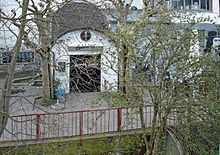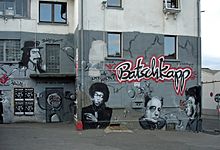 Batschkapp logo | |
 Batschkapp after the move to Seckbach (2014) | |
 | |
| Location | Seckbach, Frankfurt |
|---|---|
| Coordinates | 50°08′07″N 8°44′21″E / 50.1353°N 8.7392°E |
| Public transit | |
| Capacity | 1,500 |
| Construction | |
| Opened | 11 December 1976 |
| Reopened | 2013 (moved) |
| Website | |
| batschkapp | |
Batschkapp (Hessian dialect for 'flat cap') is a rock and pop concert venue in Frankfurt am Main. It is located in the warehouse district of the neighborhood of Seckbach, on Gwinnerstraße.[1]
History
[edit]

Batschkapp was founded in 1976 to establish an autonomous and left-wing counter culture,[2] and opened on 11 December 1976.[3] It began as a cultural centre associated with the neighbourhood centre Arbeiterselbsthilfe which was located in the inn "Zum Elfmeter", in Maybachstraße next to Frankfurt Eschersheim station. This had been called "Wirtschaft zum Bahnhof" in 1910, and used as a dormitory for approximately 100 forced labourers between 1940 and 1945. It was then used as an operetta theatre and a cinema from 1949 to 1965.[4] Joschka Fischer was a regular visitor in the early days.[5][6]
At the beginning of the 1980s, Batschkapp was in financial difficulties caused by extensions of fire safety and other standards and had tax debts of DM 30,000. A benefit concert in 1982 with Ideal and BAP among the bands generated enough profit to keep the venue in business.[7]
To celebrate its 30-year anniversary, a double CD "Batschkapp 76-06 – 30 Jahre Hörgenuss" was issued.[7][8]
Batschkapp moved on 10 December 2013. The original venue was demolished in February 2016, after archaeological excavations were made because the site was within the grounds of Rühl'sche Hof, to enable the building of flats and a supermarket.[9][10][11] The new venue in Gwinnerstraße in Seckbach is a former plastics factory and has a capacity of 1500 whereas the old venue at the bridge Maybachbrücke in Eschersheim had a capacity of 350, which was sometimes exceeded.[12][13][14] To celebrate its 40-year anniversary, a booklet "40 Jahre Batschkapp – Eine Legende" was published.[3]
Media
[edit]- The video clip Hier kommt die Schwester of the singer Sabrina Setlur, who was still using her stage name Schwester S. at the time, was filmed in front of and in Batschkapp in 1995.
- In 2007, Anja Ehrhardt filmed a 45-minute documentary Ein Musikclub wird erwachsen with appearances of Joschka Fischer, Wolfgang Niedecken and Farin Urlaub about Batschkapp for the television of Hessischer Rundfunk. The film includes scenes from the Frankfurt Techno-Party Tunnel Rave which Batschkapp held at the end of August 1994.[15]
- The management has also been running a smaller club called Nachtleben in Konstablerwache since February 1993.
Awards
[edit]Batschkapp won the Live Entertainment Award for the best club of the year at the Musikmesse Frankfurt in March 2012.[16]
References
[edit]- ^ "Batschkapp". 10best. USA TODAY, a division of Gannett Satellite Information Network, LLC. Retrieved 13 September 2016.
This legendary live music venue opened in 1976, and has been rocking Frankfurt ever since. Past performers are a varied group, including Einstürzende Neubauten, Ginger Baker, Uriah Heep, Robert Cray, The Pogues, U.K.Subs, Supergrass Korn, Hüsker Dü, the Housemartins, PJ Harvey, Billy Bragg and Die Toten Hosen.
- ^ "Batschkapp und Elfer: Zwei Musik-Kneipen in einem Haus, in harmonischer Kooperation". Outback. Retrieved 13 September 2016.
Ursprüngliches Ziel des Kollektivs war es, eine autonome und linke Gegenkultur zu etablieren.
- ^ a b Mohr, Reinhard; Scheffler, Ralf (2016). 40 Jahre Batschkapp – Eine Legende. Journal Frankfurt (in German). Batschkapp Frankfurt Kulturzentrum e.V., Ralf Scheffler, Claus Möbius. p. 56.
- ^ Scheuermann, Fabian (3 January 2015). "Die Geschichte des Batschkapp-Hauses". Frankfurter Rundschau (in German). Frankfurt: Frankfurter Rundschau GmbH. Retrieved 14 September 2016.
- ^ Walter, Klaus (14 April 2007). "Wo auch der Joschka ein und aus ging". Die Tageszeitung (in German). taz Verlags u. Vertriebs GmbH. Retrieved 14 September 2016.
- ^ "Kulturzentrum Batschkapp Frankfurt". hrz.uni-giessen.de. Archived from the original on 18 May 2009. Retrieved 2 June 2012.
- ^ a b Mohr, Christina (February 2007). "Batschkapp – 30 Jahre Hörgenuss". satt.org. Retrieved 16 September 2016.
- ^ Köhler, Mike (2 February 2007). "Batschkapp 76-06 – 30 Jahre Hörgenuss". Musikexpress – Reviews. Axel Springer Mediahouse Berlin GmbH. Retrieved 16 September 2016.
Gipfeltreffen des Alternative Rock: Die Frankfurter Club-Institution feiert ihr 30-jähriges Jubiläum.
- ^ Hampel, Andrea. "Die "Batschkapp" an der Maybachstraße". Fundgeschichten. Archäologisches Museum Frankfurt. Retrieved 16 September 2016.
- ^ Dietermann, Judith (4 March 2015). "Auf Spurensuche an der alten Batschkapp". Frankfurter Neue Presse (in German). Frankfurter Societäts-Medien GmbH. Retrieved 16 September 2016.
- ^ "Alte Batschkapp – Nur noch Schutt und Asche!". Bild (in German). Bild GmbH & Co. KG. 16 February 2015. Retrieved 14 September 2016.
- ^ Schulze, Rainer (23 August 2011). "Nach 35 Jahren in Eschersheim Frankfurter Batschkapp will umziehen". Frankfurter Allgemeine Zeitung (in German). Rhein-Main: Frankfurter Allgemeine Zeitung GmbH. Retrieved 14 September 2016.
- ^ Schulze, Rainer (20 January 2014). "Umzug der "Batschkapp": Noch keine Blondinen in der Dusche". Frankfurter Allgemeine (in German). Rhein-Main: Frankfurter Allgemeine Zeitung GmbH. Retrieved 13 September 2016.
- ^ Rosendorff, Kathrin (21 October 2013). "Mehr Platz für die Batschkapp im neuen Zuhause". WeltN24 (in German). WeltN24 GmbH. Retrieved 14 September 2016.
- ^ "Die Frankfurter Batschkapp". programm.ARD.de (in German). 8 December 2012. Retrieved 28 December 2022.
- ^ "Frankfurter Batschkapp ist Club des Jahres". Frankfurter Rundschau (in German). Frankfurter Rundschau GmbH. 21 March 2012. Retrieved 13 September 2016.
External links
[edit]- Web site of the Elfer Music Club
- Oltmanns, Reimar (1980). Du hast keine Chance, aber nutze sie : eine Jugend steigt aus (in German). Reinbek bei Hamburg: Rowohlt. ISBN 3-498-05006-0. OCLC 6710541.
- "Keine normale Figur in der Hütte". Der Spiegel (in German). 18 May 1980. Retrieved 28 December 2022.